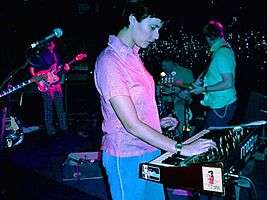Lætitia Sadier
| Lætitia Sadier | |
|---|---|
.jpg) Sadier in 2013 | |
| Background information | |
| Born |
6 May 1968 Vincennes, France |
| Genres | Post-rock, indie rock |
| Instruments | Vocals, synthesizers, guitar |
| Years active | 1987–present |
| Associated acts | Stereolab, Monade, McCarthy, blur |
Lætitia Sadier (born 6 May 1968, sometimes known as Seaya Sadier) is a French musician best known as the singer of the band Stereolab.
Stereolab
Sadier was working as a nanny when she met McCarthy guitarist Tim Gane at a gig in Paris during the late 1980s. Sadier was disillusioned with the rock scene in France, and soon moved to London to be with Gane and to pursue her career. She contributed vocals to McCarthy's final albums and when McCarthy broke up in 1990, she and Gane immediately formed Stereolab. For the first incarnation of the band, they enlisted ex-Chills bassist Martin Kean, drummer Joe Dilworth and Gina Morris on backing vocals.[1]

While Tim Gane has written the bulk of the music in Stereolab, Sadier is the main contributor of lyrics, written in both English and French. Sadier also plays keyboards, percussion, guitar and trombone.
Collaborations and other projects
In 1996, Sadier formed Monade with Pram's Rosie Cuckston. Monade released the singles "The Sunrise Telling" and "Witch Hazel/Ode to a Keyring" in 1997. The band's debut album Socialisme ou barbarie: The Bedroom Recordings was released on Duophonic Records in Europe and Drag City in the US in 2003. Their second album A Few Steps More was released on Too Pure in 2004. Monade's third, Monstre cosmic, was released in February 2008 on Duophonic.
Sadier has contributed vocals to various groups and projects, at times along with the late Stereolab member Mary Hansen. She and Hansen had contributed vocals to various recordings of The High Llamas (band of sometimes-Stereolab member Sean O'Hagan) and to the Gane/O'Hagan side project Turn On. Sadier added French backing vocals on "To the End", a top 20 hit for Blur in 1994. In 1995, she recorded the Serge Gainsbourg/Brigitte Bardot song "Bonnie and Clyde" with Luna. In 2001, Sadier sang on "Sol y sombra" on Fugu's Fugu 1 LP on Minty Fresh Records. In 2002, Sadier sang the chorus on "New Wave" from Common's album Electric Circus. She sang lead vocals on "Haiku One" from Sigmatropic's 2004 album Sixteen Haiku & Other Stories which was an album based on the poetry of Greek poet Giorgos Seferis. In 2009 the French label Deux Mille released an EP which features Sadier singing with Toulouse-based band Momotte.
Throughout the years, Sadier has occasionally collaborated with German electronica group Mouse on Mars. In 1997, Sadier sung on "Schnick Schnack Meltmade" on Mouse on Mars' Autoditacker LP, and she and Mary Hansen contributed vocals to the Cache cœur naif EP. In turn, Mouse on Mars produced tracks on Stereolab's Dots and Loops LP. In 2007, Sadier wrote songs with MoM and toured with them in Italy. They have yet to record the songs for release.[2]
Sadier also contributed backing vocals to the track "Go Round" on The Hair and Skin Trading Company's 1993 album Over Valence.
Sadier also wrote and sang the lyrics to the track "Quick Canal" by Atlas Sound for the 2009 release Logos.
Laetitia is a collaborator on the Tyler, the Creator album "Wolf". She sings an interlude on the track "PartyIsntOver/Campfire/Bimmer".
She sings on the "Summer Long" song, in Brazilian band Mombojó's Alexandre 2014 album.
She wrote the lyrics and sings "La Ballade" from Adrian Younge's 2016 album "Something About April II".
Solo
In 2010 she released a solo album called The Trip. In 2012 she released her second solo album entitled Silencio
Personal life
While she spent most of her formative years in France, Sadier's family travelled extensively and she lived briefly in the U.S. as a child.[3]
Tim Gane and Lætitia Sadier have a son, born in 1998.
Solo discography
Albums
Singles
- La Piscine – An Invitation by Lætitia Sadier to Keep On Swimming (12", Wool, 2011)
with Monade
- Socialisme ou barbarie (The Bedroom Recordings) (Duophonic, 2003)
- A Few Steps More (Too Pure, 2005)
- Monstre cosmic (Too Pure, 2008)
References
- ↑ "Stereolab Biography at Allmusic.com".
- ↑ "Laetitia Sadier Interview". Cokemachineglow.com. Retrieved 23 September 2014.
- ↑ "Lætitia Sadier". Cokemachineglow. 2008. Retrieved 23 September 2014.
External links
- Laetitia Sadier talks about her music and singing (interview in French).
- Laetitia Sadier talks about her career and the album, Monstre Cosmic
- Laetitia Sadier on the light within and the work without, Bluefat